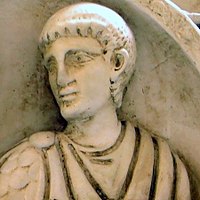Flavius Aëtius
| Flavius Aetius | |
|---|---|

Possible relief of Aetius, although the sarcophagus has also been mused to depict Stilicho (d. 408 AD), and can be dated even earlier between 387-390 AD, during the reign of Theodosius I
|
|
| Nickname(s) | Last of the Romans |
| Born | c. 391 AD Durostorum |
| Died | September 21, 454 AD Ravenna |
| Buried at | Unknown, Possibly the Stilicho Sarcophagus |
| Allegiance | Western Roman Empire |
| Service/branch | Roman army |
| Years of service | 405-454 |
| Rank | Magister Militum |
| Commands held | Tribunis Partis Militaris Cura Palatii Magister Militum per Gallias Comes et Magister Utriusque Militiae (Junior) Comes et Magister Utriusque Militiae (Senior) Magnificus vir Parens Patriciusque Noster Consul |
| Battles/wars |
Siege of Arelate (426) Frankish War of 428 Norican Campaign of 430 Siege of Arelate (431) Frankish War of 432 Battle of Rimini Visigothic War of 436 Burgundian Revolt of 435 Siege of Narbona (436) Sack of Worms (436) Battle of Mons Colubrarius Battle of Vicus Helena Battle of the Catalaunian Plains Invasion of Italy (452) Spanish Campaign of 453 |
Flavius Aetius /ˈfleɪviəs eɪˈiːʃiəs/ (Latin: Flavius Aetius; 391–454), dux et patricius, commonly called simply Aetius or Aëtius, was a Roman general of the closing period of the Western Roman Empire. He was an able military commander and the most influential man in the Western Roman Empire for two decades (433-454). He managed policy in regard to the attacks of barbarian federates settled throughout the Western Roman Empire. Notably, he mustered a large Roman and allied (foederati) army to stop the Huns in the Battle of the Catalaunian Plains, ending the devastating Hunnic invasion of Attila in 451.
He has often been called "the last of the Romans". Edward Gibbon refers to him as "the man universally celebrated as the terror of Barbarians and the support of the Republic" for his victory at the Catalaunian Plains.
Aetius was born at Durostorum in Moesia Inferior (modern Silistra, Bulgaria), around 391. His father, Flavius Gaudentius, was a Roman general of Scythian origin, As the term "Scythian" was frequently used in late antiquity for East Germanic tribes, Joseph Cummins notes that Gaudentius was possibly of Gothic origin. Aetius' mother, whose name is unknown, was a wealthy aristocratic woman of Italian ancestry. Before 425 Aetius married the daughter of Carpilio, who gave him a son, also named Carpilio. Later he married Pelagia, widow of Bonifacius, from whom he had a son, Gaudentius. It is possible that he had also a daughter, wife of Thraustila who avenged Aetius' death by killing emperor Valentinian III.
...
Wikipedia
